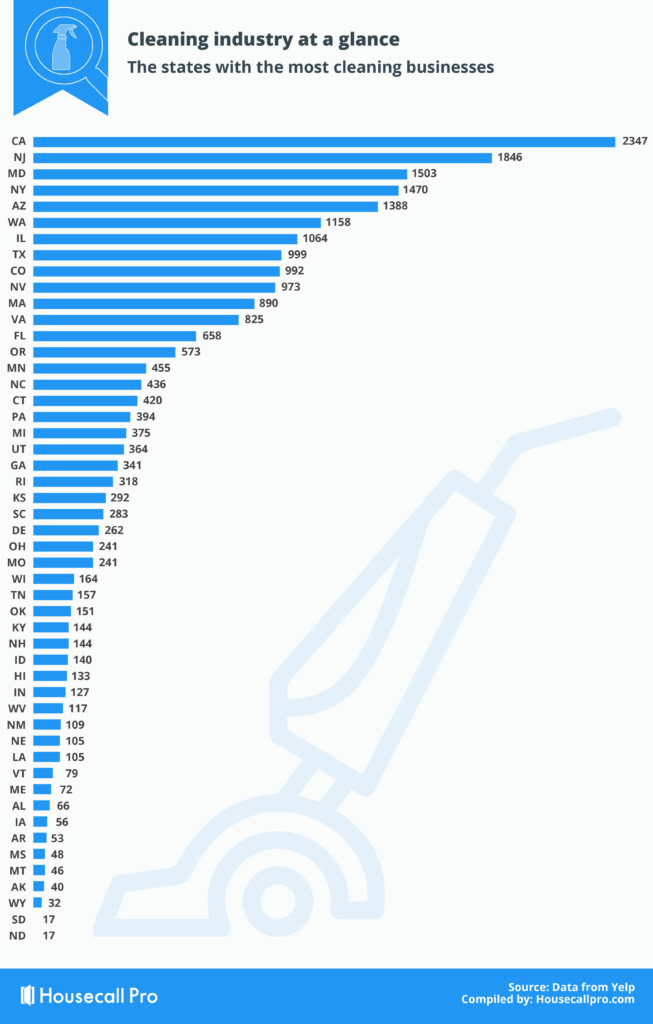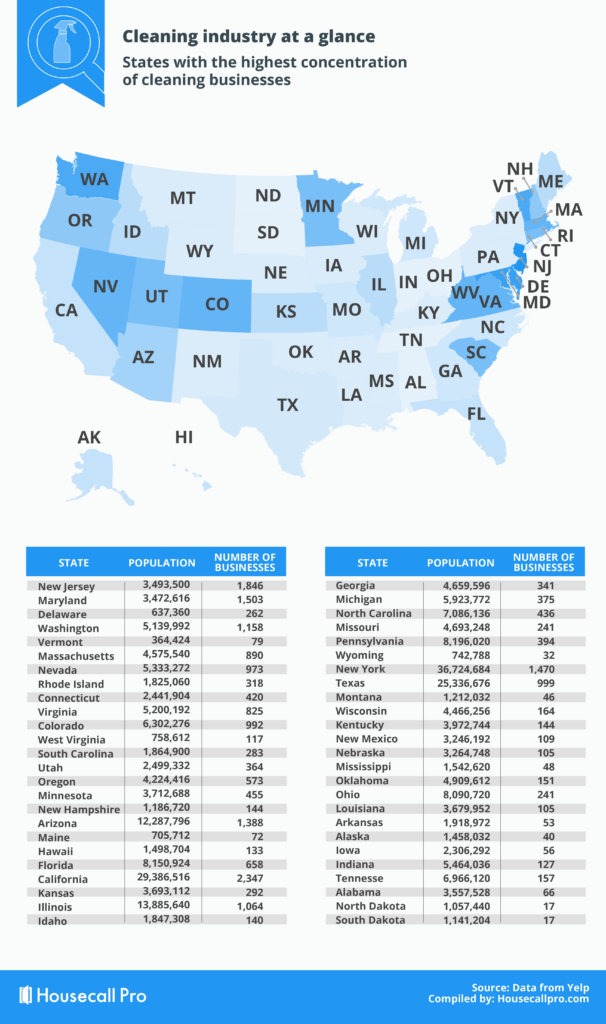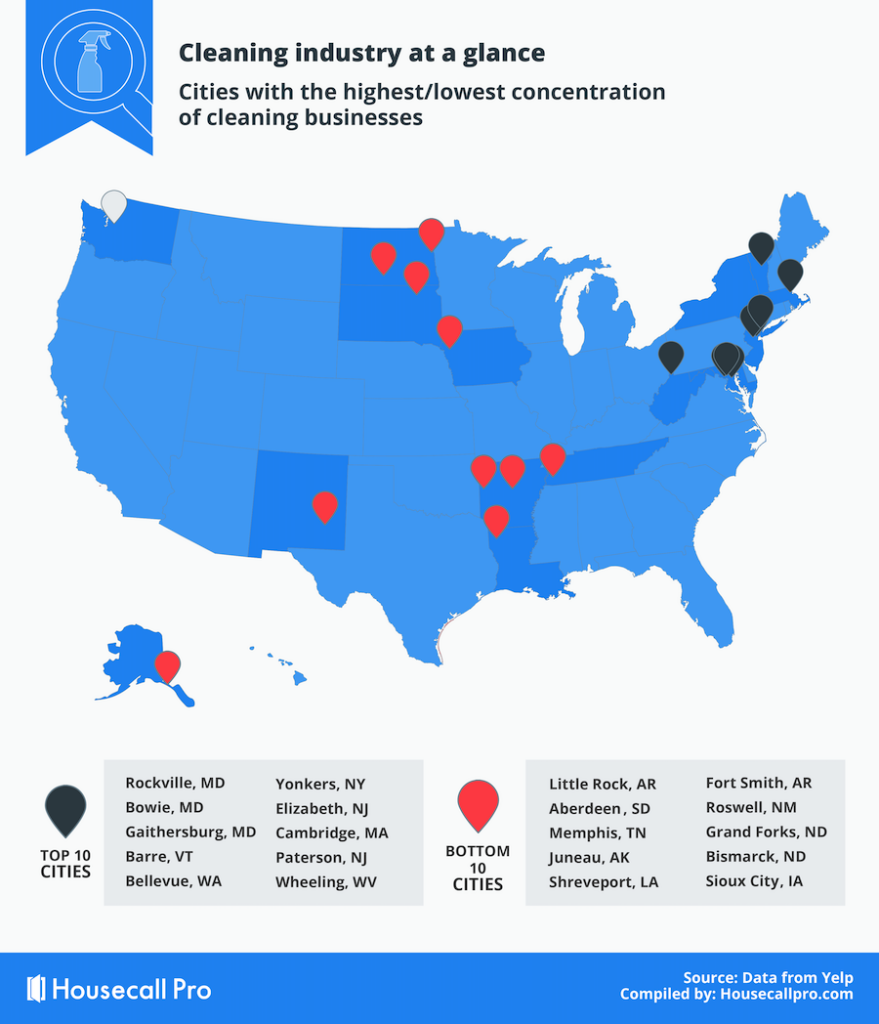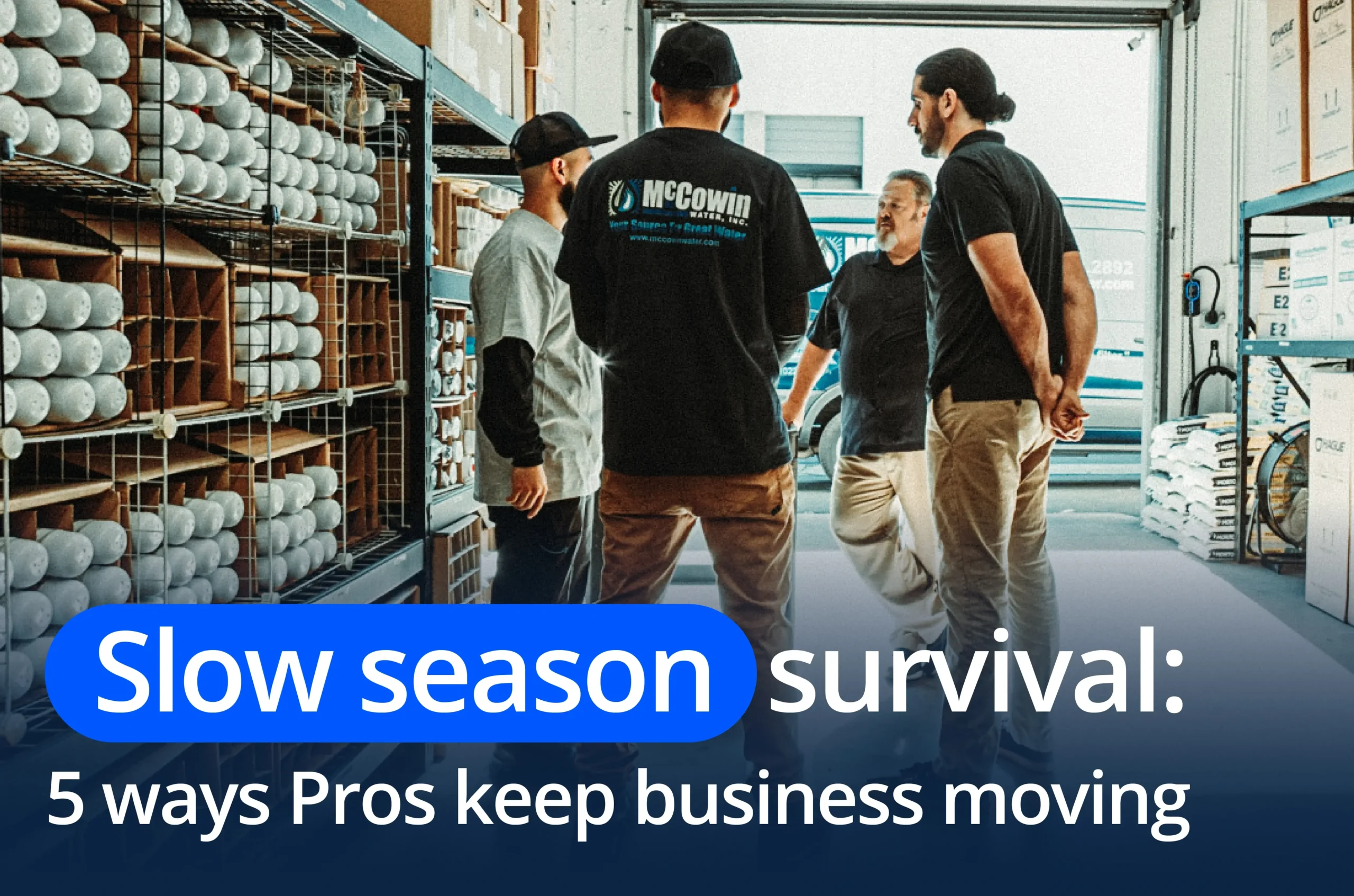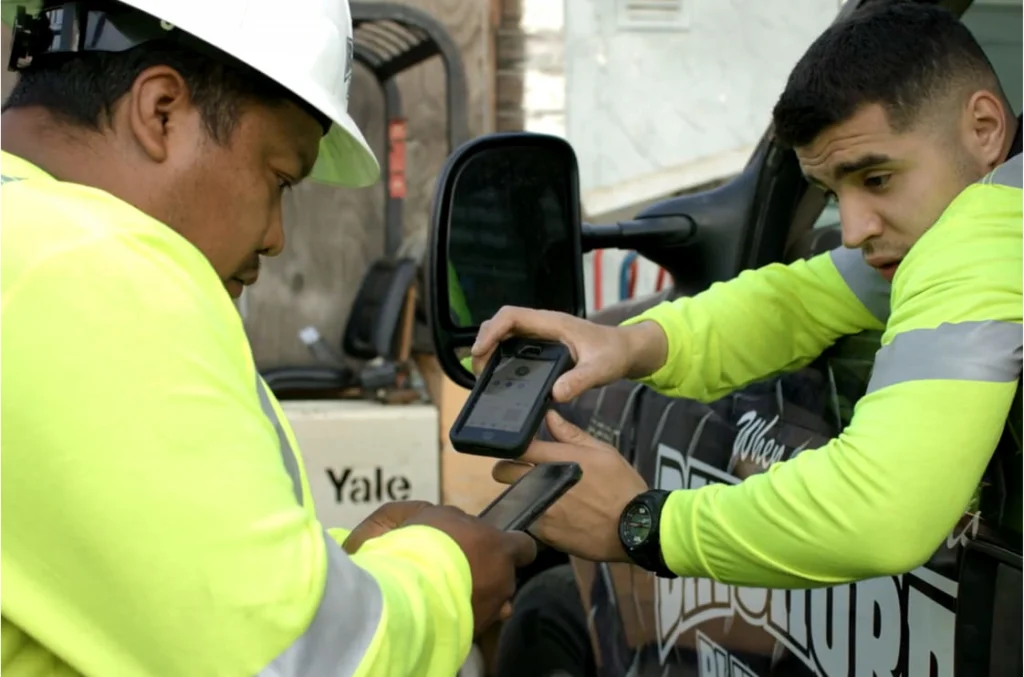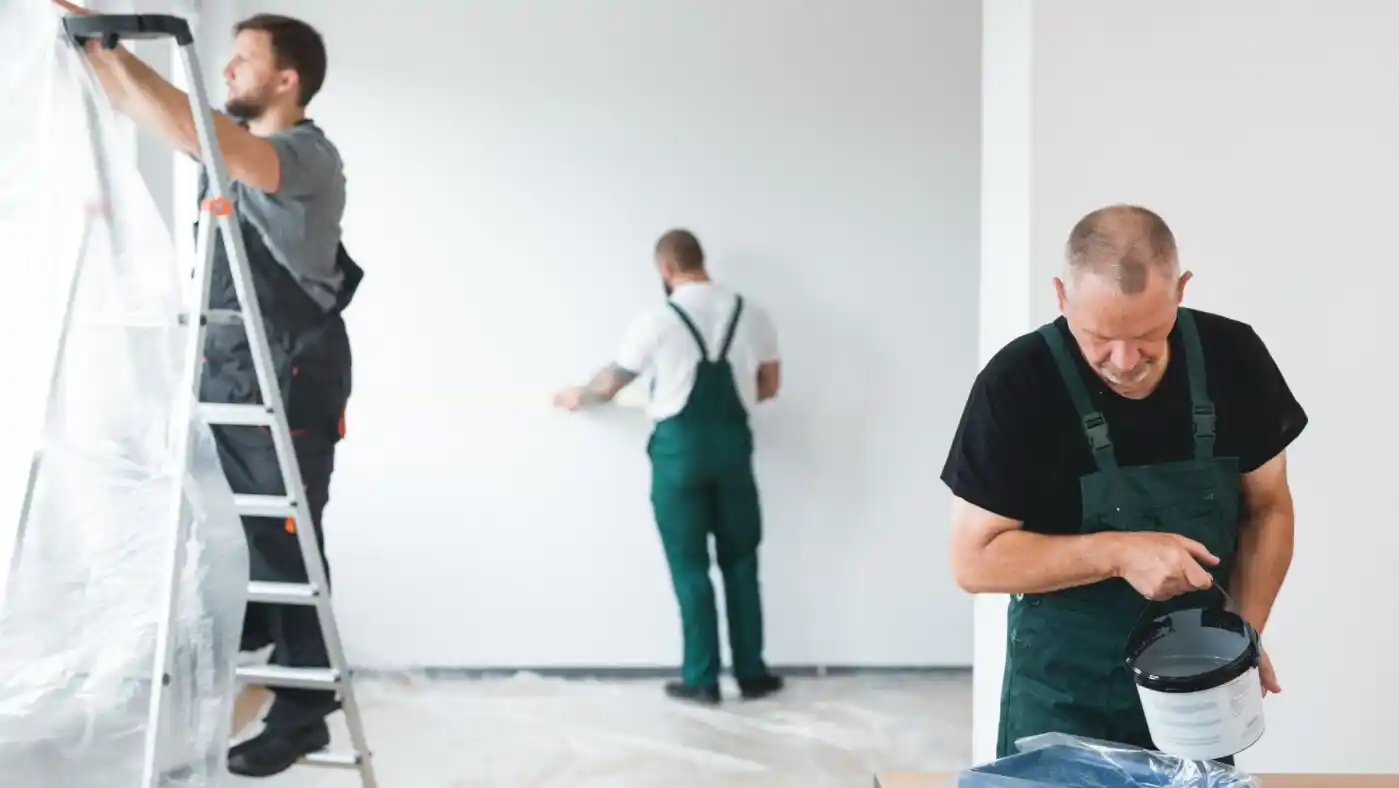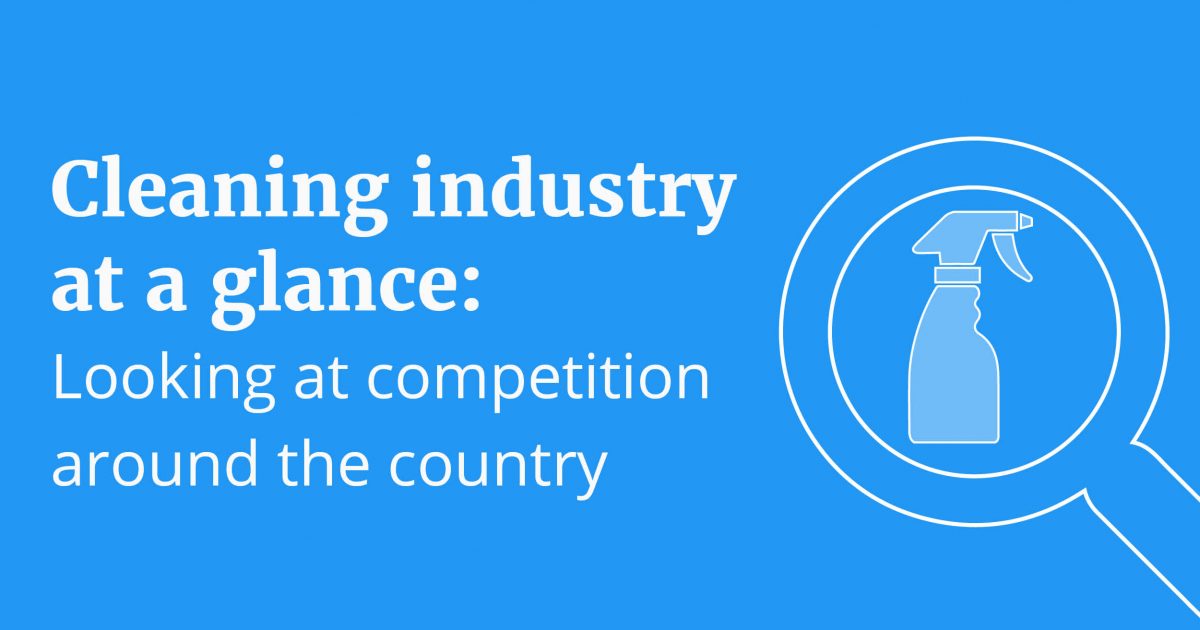
Last Updated: July 2022
The cleaning industry is not for the faint of heart. Every day you deal with messes, refuse, and straight up garbage. You have to invest a lot of blood, sweat, and tears in order to run a highly successful cleaning business.
If you’re planning on starting a cleaning business, expanding an existing one, or trying to get a job in the cleaning industry, it can be very helpful to know what the existing competition is like.
- Which states have the greatest competition in the cleaning industry?
- Which states are most conducive to starting a cleaning business?
- Where are you most likely to find a job in the cleaning industry?
Of course, this is difficult information to come by. How can you know how many cleaning businesses are in a particular state? How can you determine the overall competition in a particular city? Where would you possibly get that kind of information?
That’s where we come in. We scraped data from thousands of businesses on Yelp, sorted and analyzed the data, and present it here for your consideration. We determined which states had the most cleaning businesses overall, which have the most relative to the population of the top five cities, and which particular businesses have a significant number of cleaning businesses.
For each state and city, we assigned a concentration score that looks at the population versus the number of businesses. This allows us to compare states to each other.
Ready? Let’s dive in.
The States With The Most Cleaning Businesses
First, let’s look at the states with the most overall cleaning businesses. This can give us a sense of where the cleaning industry as a whole is thriving, as well as which states have a significantly less booming industry.
- The state the the most cleaning businesses is California, with 2,347.
- The state with the least cleaning businesses is North Dakota, with 17.
The total number of cleaning businesses seems to be determined by three particular factors. First, if a state has a high overall population, like California does, then there are more cleaning businesses. This makes sense on an intuitive level. A higher population means more cleaning needs, which then means more cleaning businesses.
Second, if a state has a number of large cities, such as Arizona, this also drives up the demand for cleaning services. More large cities means denser population centers, which in turn means more need for cleaning.
Finally, if a state sits next to a large city in another state, it can also drive up the overall number of cleaning businesses. For example, New Jersey sits relatively close to New York City. Presumably, some cleaning businesses in New Jersey serve areas in New York City. This then drives up the demand for cleaning businesses in New Jersey.
If you’re considering starting a cleaning business, you may want to consider two factors. States with larger populations have more demand for cleaning services. However, they also have more competition. Ideally, you want to start a business in a state with a large population and relatively small competition.
If you’re looking for a job, you may want to consider looking in states with larger populations. Yes, the competition for jobs will also be higher there, but there are so many more jobs available than there are in smaller states like North Dakota.
When it comes to hiring cleaning technicians, you’ll find that there’s more competition in states with fewer businesses. Because there are so few jobs available in states like Wyoming, we should expect to find the competition for those jobs to be relatively high.
But this doesn’t give us the full picture. We also need to look at the concentration of cleaning businesses relative to each state’s population.
States With The Highest Concentration of Cleaning Businesses
Looking at the states with the highest concentration of cleaning businesses gives us another picture of the cleaning industry.
- The state with the highest concentration of cleaning businesses is New Jersey, with a concentration score of 52.84.
- The state with the lowest concentration of cleaning businesses is South Dakota, with a concentration score of 1.49.
This data is a bit more difficult to interpret. However, we can make educated guesses about some of the data points. As noted above, the number of businesses (and overall concentration) in New Jersey is relatively high. This can most likely be attributed to the fact that New Jersey sits close to New York City and many businesses in New Jersey also service New York City.
The same can be said of Maryland, which sits close to Washington, D.C. In addition to cleaning businesses servicing large cities like Baltimore, many also service Washington, D.C., which increases the overall concentration of businesses in the state.
Other states, such as Delaware, while having a smaller population, do have some large cities, such as Wilmington. This, in turn, drives up the number of cleaning businesses and the overall concentration score.
Smaller states, such as South Dakota, have relatively small populations, thus driving down the concentration score.
If you’re considering starting a cleaning business, you may want to look for a state that sits right in the sweet spot of population and concentration score. In other words, look for a state that has a relatively high population and a relatively low concentration score. Alabama, for example, fits these criteria.
However, before you choose a state in which to start a cleaning business, we also need to look at the concentration of businesses in particular cities.
Cities With The Highest Concentration of Cleaning Businesses
Looking at the top 10 cities with the highest concentration of cleaning businesses gives us yet another picture of the cleaning industry. The same goes for the bottom 10 cities.
The cities with the highest concentration of cleaning businesses relative to their populations are Rockville, MD, and Bowie, MD. On the surface, this may seem confusing given that the populations are relatively low and the number of cleaning businesses are relatively high.
But a closer look shows that both of these cities sit relatively close to Washington D.C., which has a much higher population than Rockville and Bowie. This, presumably, pushes the cleaning needs much higher. Additionally, with the government itself sitting in D.C., the cleaning needs are even higher still.
Other cities, such as Barre, Vermont, are a bit more difficult to interpret. It’s not clear why there is such a high concentration of cleaning businesses in such a small city.
On the other side of the coin, other cities relatively small cities such as Sioux City, Iowa, have very low concentration scores. Again, these cities are also rather difficult to interpret. It’s not clear why the city has such a low number of cleaning businesses relative to the population.
In some of these cities, it’s possible that the low population of the state contributes to the low number of cleaning businesses. Grand Forks, North Dakota would be an example of this. There are only 17 total cleaning businesses in the entire state, and thus we should expect a low number of cleaning businesses in specific cities.
Then there are those businesses which have relatively high populations and relatively low concentration scores. Memphis, which has a population of almost 700,000 is a prime example of this.
It is these cities which are ripe for the taking when it comes to starting a cleaning business. The competition is relatively low and the population is relatively high. Presumably, this means that the demand for cleaning outstrips the supply. More cleaning businesses are needed in these cities.
Final Thoughts
Several key findings emerge from this data. First, it’s not enough to simply look at the number of businesses in a given state. In order to truly determine the competition, you must also look at the concentration of those businesses. If you want to start a business, you want to consider states that have a relatively high population and relatively low concentration score.
Second, when starting a cleaning business, you also should consider how close your business will be located to large cities. If your business is in close proximity to a large city, it can significantly drive up the demand for cleaning services. Smaller cities that sit close to large cities can be ideal places to start a cleaning business.
If you’re seeking a job in the cleaning industry, you may want to consider looking in a state with a larger population. Significantly more jobs will be available in these states than in states with smaller populations. For example, California will have many more jobs available than North Dakota.
Methodology
A quick note about our methodology for calculating the above numbers. First, we scraped data from thousands of businesses listed on Yelp. Then we totaled the population of the top five cities in each state and divided the number of businesses by the population total. This gave us a “concentration” score which represents the density of cleaning businesses in a state. Finally, we multiplied that concentration score by 100,000 to give us a number that is more easily comparable between states.
